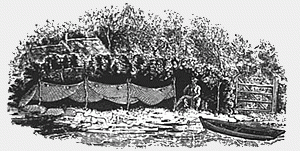5. Testaments Dative Qua Nearest Of Kin

Alexander Murphy rented a dwelling or lived in someone else's house in Easter Bennan on the island of Arran and he made his living by fishing (he was the joint owner of a fishing boat). He died intestate in 1762 or 1763 and his nearest relative was his sister Mary, who was married to Archibald Robertson, and they also lived in Easter Bennan. Mary Murphy was entitled to claim the movable estate of her late brother, but she faced an obvious complication: some of the movable estate was in the form of a share of a fishing boat and equipment.
To establish her rights to the movable estate and obtain an act of court (which she could use to back up her claim if any dispute were to arise) she went to the Commissariot of the Isles, in Rothesay, to have a testament dative registered.
On the 27 May 1763 she appeared before the Commissar, John Blair, who had previously given public notice of the hearing, warning anyone who might have an interest in the estate to be present at court.
Mary Murphy presented an inventory of her late brother's movable goods:
- a half share in the fishing boats and nets
- a horse
- furniture and household goods
- clothes
- a barrel of herring
She had to declare any debts owed by the deceased or to him. In this case Alexander Murphy appears to have been neither a debtor nor a creditor at the time of his death, so no debts are listed.
The testamentary process required that, in the event of anyone challenging the settlement of the estate (for example a rival claimant or a creditor requiring a debt to be paid), she would reappear in court to show that the settlement had been legally carried out and to meet any outstanding obligation. To do this she had to provide the court with a guarantee: caution (pronounced 'kay-shun'), which was similar to the idea of bail in a criminal case. This meant persuading another person (cautioner), usually a resident in the court's jurisdiction or someone the court felt was trustworthy, to agree a bond of caution, by which the cautioner would be penalised if the executor failed to resolve any challenge in court. In this case Mary Murphy persuaded Alexander Robertson, Excise Officer in Rothesay (probably a relative of her husband) to be cautioner.
The Commissar duly confirmed the testament dative and in the next few pages we'll examine its constituent parts.
Glossary
| Term | Definition |
|---|---|
| debtor | an individual who was in debt to the deceased |
| creditor | an individual to whom the deceased was in debt |
| caution | security or surety |
| cautioner | the person who becomes security |
| Commissar | judge in a commissary court, the where testaments were registered |
| confirmed | officially empowered an executor to possess and administer the property of a deceased person |